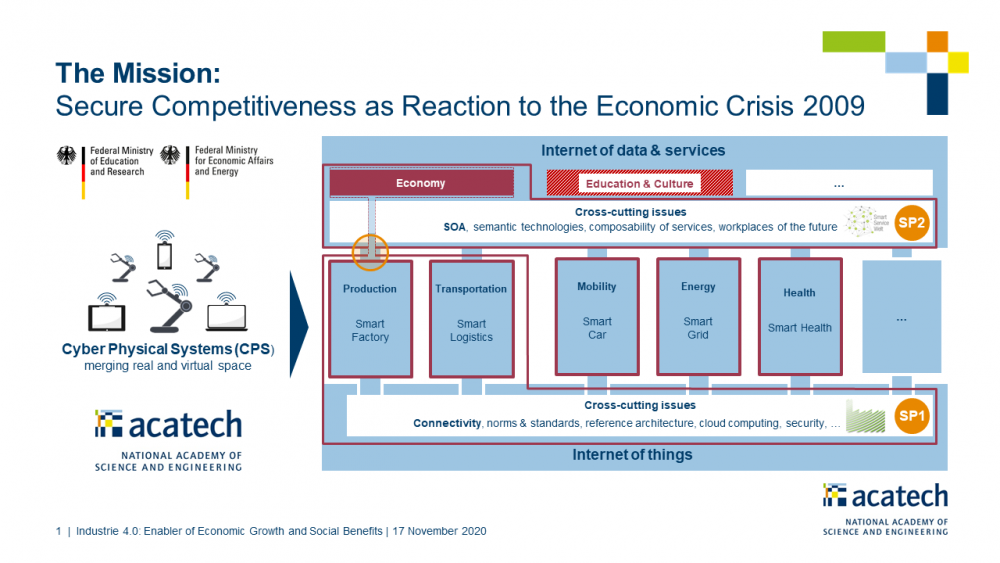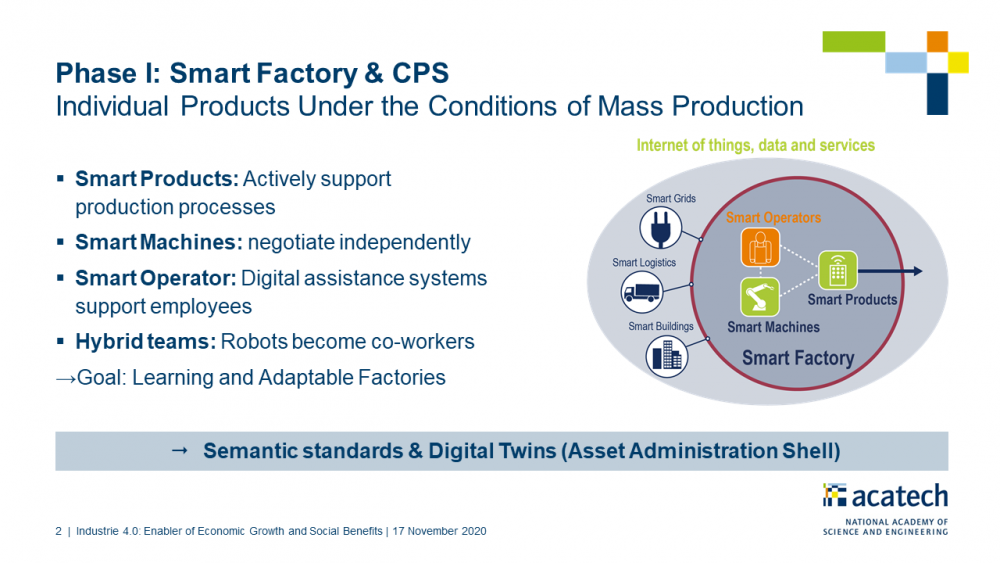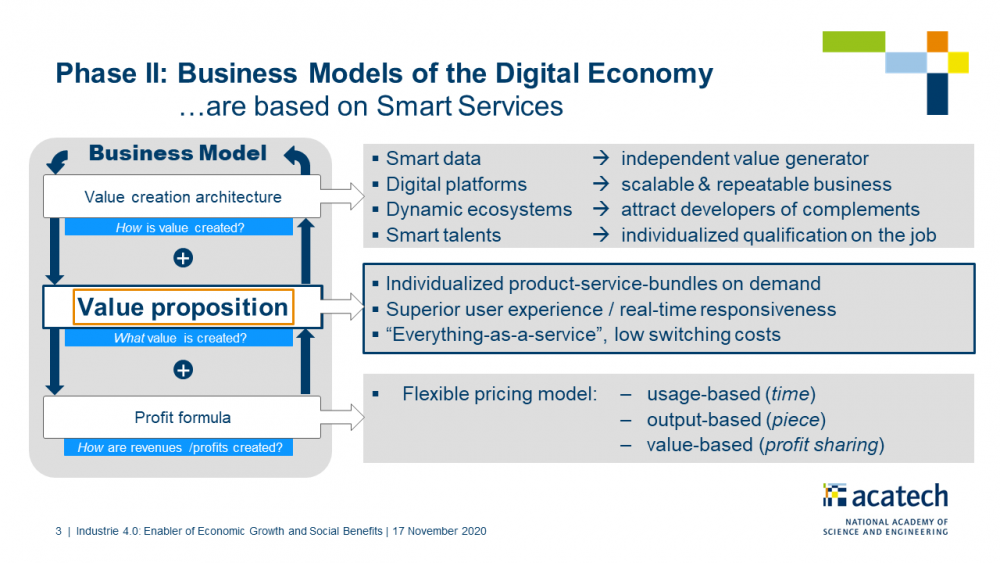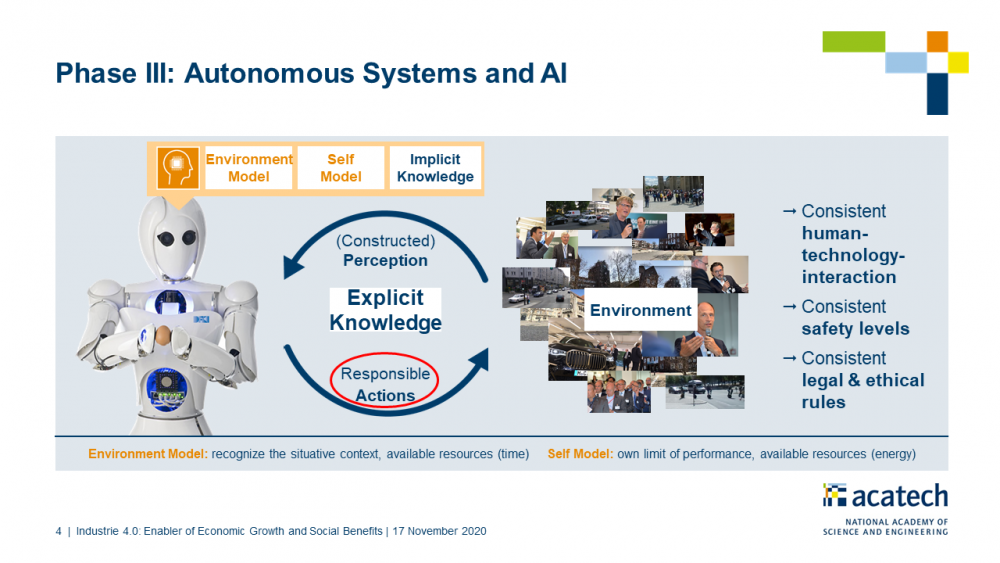* Information concerning affiliation/post/profile of the laureate and guests is current at the time he/she received the prize.
2020 Honda Prize Achievement Commentary
Transition to a Resilient Society against Crisis
The idea of Industrie 4.0 was inspired by the Lehman Brothers economic crisis in 2008.
Dr. Kagermann came up with the idea that the transition to a resilient society requires application of the IoT technology now approaching maturity to creating cyber-physical systems that merge real and virtual space and the construction of totally new business processes and models. In 2011 and 2012, lively debate took place in Germany over bringing together the online and offline worlds. Under the direction of Dr. Kagermann, acatech exercised leadership in this debate. In 2013, a paper published by Dr. Wolfgang Wahlster (Founding Director of the German Research Center for Artificial Intelligence) and Dr. Wolf-Dieter Lukas (State Secretary, German Federal Ministry of Education and Research) caused a sensation.
Dr. Kagermann attributes the wide acceptance of the concept to its focus on manufacturing and logistics, which are strengths for Germany’s industries, cooperation gained from the federal government, businesses, the scientific community and labor unions at an early stage and presentation of the concept as a revolution that will bring about drastic change not only in the economy but in the whole of society including education and culture.
Industrie 4.0 has three main aspects. First is the shift to "mass customization," producing customized products adapted to customer demands on a real-time basis and under mass production conditions to enhance adaptability and improve productivity. Second is to drastically improve resource and energy efficiency and to separate economic growth and resource consumption. This later developed into the concept of the circular economy. Third is employability. A system supported by autonomous systems is created to adapt to aged workers in the work environment and enable people to engage in better and more meaningful work.
Dr. Kagermann came up with the idea that the transition to a resilient society requires application of the IoT technology now approaching maturity to creating cyber-physical systems that merge real and virtual space and the construction of totally new business processes and models. In 2011 and 2012, lively debate took place in Germany over bringing together the online and offline worlds. Under the direction of Dr. Kagermann, acatech exercised leadership in this debate. In 2013, a paper published by Dr. Wolfgang Wahlster (Founding Director of the German Research Center for Artificial Intelligence) and Dr. Wolf-Dieter Lukas (State Secretary, German Federal Ministry of Education and Research) caused a sensation.
Dr. Kagermann attributes the wide acceptance of the concept to its focus on manufacturing and logistics, which are strengths for Germany’s industries, cooperation gained from the federal government, businesses, the scientific community and labor unions at an early stage and presentation of the concept as a revolution that will bring about drastic change not only in the economy but in the whole of society including education and culture.
Industrie 4.0 has three main aspects. First is the shift to "mass customization," producing customized products adapted to customer demands on a real-time basis and under mass production conditions to enhance adaptability and improve productivity. Second is to drastically improve resource and energy efficiency and to separate economic growth and resource consumption. This later developed into the concept of the circular economy. Third is employability. A system supported by autonomous systems is created to adapt to aged workers in the work environment and enable people to engage in better and more meaningful work.




The History of Industrie 4.0
The activities from 2011 to the present can be classified into three phases.
In the first phase (2011—2013), the theme was a review of all business processes and examination of the workplaces of the future. The "smart factory" and "cyber-physical systems" that combine business processes and IT processes and constitute digitally strengthened elements are implemented. To merge real and virtual space, the distinctive characteristics of factory materials and equipment must be expressed digitally and shared. For this purpose, standardization is essential.
In the second phase (2013—2018), business models and ecosystems in the digital age were studied. The solution for this is "smart services." Everything will be made available "as a service" on the digital technology platform. Here, data creates business value and forms the foundation for dynamic ecosystems. This realizes improved satisfaction for consumers (user experience) and at the same time flexibility in workstyles without time and location constraints. At the same time, efforts for employability, including lifelong learning, are executed to secure work and quality of life for employees.
The key in the third phase (2015—2017) is autonomous systems. To enable the systems to learn and make decisions appropriately, it is necessary for them to gain not only knowledge based on highly advanced sensory detection with sensor technology but also to build an environmental model based on social, legal, ethical implications and laws of nature, etc. Autonomous systems will be able to resolve social issues with "responsible behavior" only when these prerequisites are satisfied.
In the first phase (2011—2013), the theme was a review of all business processes and examination of the workplaces of the future. The "smart factory" and "cyber-physical systems" that combine business processes and IT processes and constitute digitally strengthened elements are implemented. To merge real and virtual space, the distinctive characteristics of factory materials and equipment must be expressed digitally and shared. For this purpose, standardization is essential.
In the second phase (2013—2018), business models and ecosystems in the digital age were studied. The solution for this is "smart services." Everything will be made available "as a service" on the digital technology platform. Here, data creates business value and forms the foundation for dynamic ecosystems. This realizes improved satisfaction for consumers (user experience) and at the same time flexibility in workstyles without time and location constraints. At the same time, efforts for employability, including lifelong learning, are executed to secure work and quality of life for employees.
The key in the third phase (2015—2017) is autonomous systems. To enable the systems to learn and make decisions appropriately, it is necessary for them to gain not only knowledge based on highly advanced sensory detection with sensor technology but also to build an environmental model based on social, legal, ethical implications and laws of nature, etc. Autonomous systems will be able to resolve social issues with "responsible behavior" only when these prerequisites are satisfied.
Future Vision
The next objective is to build a digital ecosystem on a global scale, founded on international cooperation.
In the course of the process, we must address the issues of diversity and openness, interoperability, data
security and privacy. We will need to move forward while sharing experiences and best practices and maintaining a balance between economic competitiveness and social welfare, openness and intellectual property protection and personal interests and group objectives.






